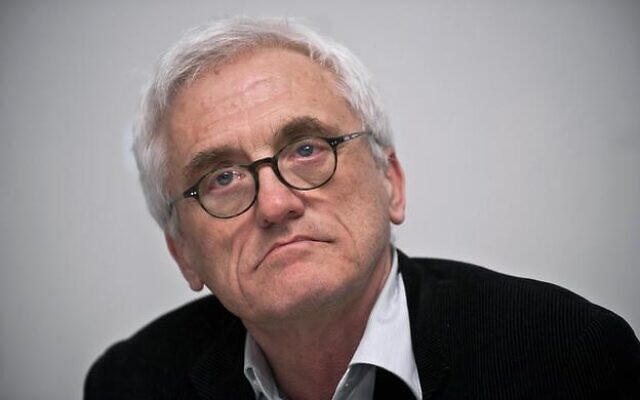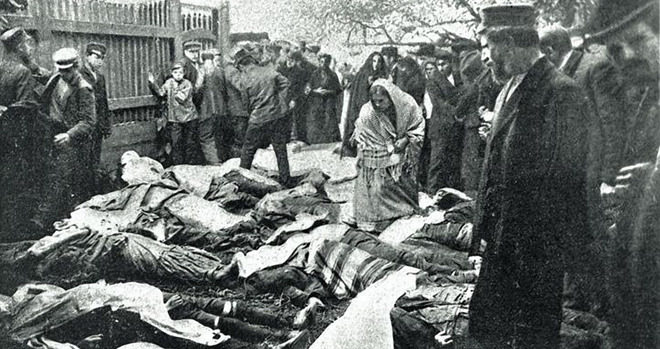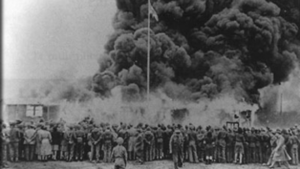I became your enemy because I tell you the truth.
Facing criticism for its inclusion of Polish pogroms against Jews during the Holocaust in its recent report on the damages by Germany during World War II, the chairman of the Polish committee that wrote the document has offered the following justification: The Nazis should have protected them.
Earlier this month, the Polish government released a three-volume, 1,300-plus-page document, “The Report on the Losses Sustained by Poland as a Result of German Aggression and Occupation during the Second World War, 1939–1945,” which was billed as calculating the reparations that Poland believes it deserves from Germany.
The third volume includes a list of 9,293 villages, towns and cities where “Nazi German atrocities” took place, along with their death tolls. Poland has demanded 1.3 trillion euros ($1.29 trillion) in reparations from Germany for the damages, primarily for the human toll of the war.
Germany has rejected the demand.
Included in that list are a number of villages that saw pogroms by ethnic Poles in which hundreds or even thousands of Jews were massacred.
The village of Jedwabne in northeastern Poland is the best-known site of one of these pogroms, in which hundreds of Jews — possibly as many as 1,600 — were burned alive or otherwise murdered by their Polish neighbors in July 1941. Similar atrocities occurred in other villages in the area in the summer of 1941, as Germany captured the area from the Soviets, who had brutally occupied it since 1939.
“Due to Germany’s aggression, the Third Reich & the USSR occupied Polish lands. International conventions state occupiers are responsible for the population’s safety, lives & property. Jedwabne was under USSR & Third Reich occupation, killing the citizens of the Second Republic,” wrote Arkadiusz Mularczyk in a tweet.
Mularczyk, the chair of the Polish committee that wrote the report, was apparently referring to the 1907 Hague Conventions, which require an occupying power to “ensure, as far as possible, public order and safety.”
Asked her thoughts on this justification, Israeli Holocaust researcher, Havi Dreifuss, used the Yiddish expression of exasperation, “nu shoyn,” while saying the claim sounded “like a bad joke.”
Dreifuss, who is both a history professor at Tel Aviv University and a researcher at the Yad Vashem World Holocaust Remembrance Center, heading the Holocaust in Poland Center, said at least Mularczyk was acknowledging that Poles carried out a pogrom in Jedwabne, as in the past, there were Polish false claims that German soldiers conducted it.
To say that it was the responsibility of the Germans to prevent it sounds like a bad joke
Dreifuss dismissed the report as being more about current geopolitics than about the historical record.
“The report is not a historical essay, it’s a political document. It uses and misuses history to demand economic and moral claims,” she told The Times of Israel on Monday.
Poland has been grappling with its Holocaust legacy for decades, and specifically with what happened at Jedwabne since 2000 — when a Polish American historian, Jan Tomasz Gross, wrote a book about the event entitled “Neighbors,” which caused a major stir in Poland when it was released.
For decades after the war, while it was under Soviet influence, Poland largely saw itself as blameless in the Holocaust, focusing on the role that its partisans played in fighting the Nazis and on the actions of “righteous among the nations,” non-Jews who saved Jews during the Holocaust, as though they were the norm and not the exception.
According to Dreifuss, in Poland, these “righteous” people had to hide their actions not only from the Germans but also (and sometimes even mainly) from their Polish environment.
“[During the Cold War,] there was no independent research in Poland, which started in a very impressive manner after the fall of the Iron Curtain. But even before then, there were some more critical voices regarding Polish involvement in the Jewish tragedy during the Holocaust,” Dreifuss said.
In 1987, a Polish literary critic, Jan Błoński, wrote a much-discussed article in a local newspaper demanding that Poland acknowledge its passivity during the Holocaust, which prompted a fierce backlash and strenuous insistence of Polish innocence by some, but also legitimate deliberation by others.
Those debates grew stronger after the release of “Neighbors,” which prompted a government inquiry that found Poles had indeed burned alive their Jewish neighbors in Jedwabne and committed pogroms elsewhere.

The reasons why the Poles did this were less clear. Antisemitism alone, which undoubtedly existed in these areas, could not sufficiently explain it.
“Between the two world wars, Jews faced antisemitism in Poland, especially from the mid 1930s. Yet, there were not any massacres (or even anything close to it) as there were during the Holocaust,” Dreifuss said.
“These massacres of Jews by their Polish neighbors occurred in the context of Nazi Germany’s antisemitic policy, the former Russian occupation, and the brutality of the Second World War. But saying that it was German responsibility to prevent killings of Jews by Poles during the Holocaust is so out of context, that it almost sounds like a bad joke. Polish officials know history; thus, this saying is not only unhistorical but also very disturbing,” she said.
In the 20 years since “Neighbors” was published, further studies have been written finding yet more Polish involvement in the execution of the Final Solution, with one researcher, Jan Grabowski, estimating that roughly 200,000 of the 3 million Polish Jews killed in the Holocaust were either directly or indirectly killed by Poles.
Earlier this month, Grabowski told The Times of Israel that the Polish report was “appalling” and accused the government of intentionally ignoring Polish involvement in the Holocaust.
The current Polish government has explicitly sought to change the narrative of the country’s role in the Holocaust.
It has, for instance, fought strongly and successfully against the erroneous term “Polish concentration camps” to describe Nazi sites on Polish soil, like Auschwitz or Treblinka.
We’re seeing a new stage of Holocaust distortion. The Polish government… distorts or even outright lies about cases where Jews were killed by Poles
More recently, in 2018, Poland criminalized making claims that the Polish state was responsible or partially responsible for Nazi crimes. The move sparked an outcry from Israel, and the standoff largely ended when Poland agreed to amend the law to remove any criminal penalties.
However, it opened the door for civil lawsuits, and several have been filed against Holocaust researchers, both in Poland and outside the country, including Grabowski.
Meanwhile, Princeton University researcher Tomasz Gross has been investigated by Polish authorities for a similar but different law against “insulting” the Polish nation.
“We see a new stage of Holocaust distortion. The Polish government doesn’t deny the Holocaust — the opposite, the Holocaust is very important to it — but only specific parts of it: they stress cases, which were of course the majority, where Germans killed Jews, but conceal, distort and even rewrite cases where Poles killed Jews – and those cases are part of the Holocaust history as well.”
According to Dreifuss, this has included exaggerating the numbers of Jews saved by Polish “righteous among the nations,” lowering the number of Jews killed by Poles or even finding so-called “justifications” for those attacks, and inflating the number of Poles killed in the war.
In the case of Jedwabne, some Polish officials have claimed in the past “comments which have no historical basis.” Some tried to connect or even justify the massacres of Jews by their Polish neighbors by blaming Jews for supporting the Soviets, but this belies the actual complicated history and the fact that many of the pogrom’s perpetrators themselves served both the Soviets and the Nazis.
This explanation can instead be seen as an “an attempt to blame the Jews for their own deaths,” she added.
Dreifuss said this has been part of an overall effort by Poland’s ruling, right-wing party Prawo i Sprawiedliwość (PiS), or Law and Justice, to equate the Polish experience in the Holocaust to the Jewish experience in the Holocaust.
“This should be seen as a fight over victimhood. PiS is trying to present Polish Jews who were murdered for their Jewishness and alongside other European Jews, as part of the Polish victims killed in World War II. By blurring the mass murder of Jewish men, women, and children with Polish suffering they claim that Poles and Jews were equally persecuted and stress the Polish torment. Poles and Jews were unequal victims and should be seen as such; Nazi Germany got support for her murderous acts all over Europe – Poland included,” she said.
This has led to an ongoing diplomatic rift between Warsaw and Jerusalem. Trips to Poland by Israeli high schools and by the Israeli military have been called off, with Israel saying it is due to the Polish government’s insistence that it dictate the educational content of the trips.
Dreifuss stressed, however, that there are Polish prominent scholars who do not toe the government’s line and are thoroughly researching the Holocaust; some of them even faced or are facing lawsuits for it.
“Those Polish colleagues are not only superb historians but also courage, professional, and dedicated scholars whom I admire for their academic groundbreaking works,” she said.
Dani Dayan, the chairman of Israel’s Yad Vashem Holocaust memorial museum, also decried the growing phenomenon of Holocaust distortion, which he said could be seen not only in Poland but also in Russia, Ukraine, France and other countries throughout Europe.

“Usually it goes like this,” Dayan told The Times of Israel on Monday, following an event at the museum honoring Holocaust survivors.
“[They say] ‘of course the Holocaust happened, and of course the six million Jews were massacred, and there were gas chambers and shooting pits.’ But each country says, ‘But in my country, all of the citizens tried to help.’ The truth, of course, is that this is a fallacy. In almost every single European country under German occupation, there were much more collaborators, to say nothing of bystanders, than there were righteous among the nations — those that saved Jews.”
Dayan, who made his remarks the morning after Iranian President Ebrahim Raisi cast doubt on the Holocaust, said this issue of distortion was deeply worrying as it is being perpetrated by governments and political parties with significant resources, unlike “blatant, bare-knuckled Holocaust denial,” which has become more of a fringe phenomenon.
“The problem of distortion is more serious than the problem of outright denial that is limited to fundamentalists and antisemites, like Mr. Raisi,” Dayan said.
https://www.timesofisrael.com/poland-defends-including-pogroms-in-reparation-demands-nazis-should-have-saved-jews/?utm_source=The+Daily+Edition&utm_campaign=daily-edition-2022-09-21&utm_medium=email
Michael Loyman


